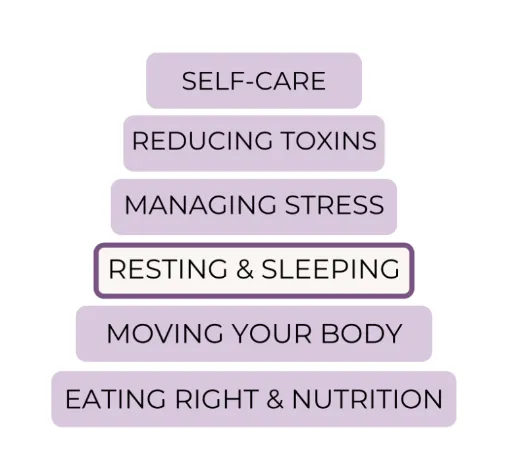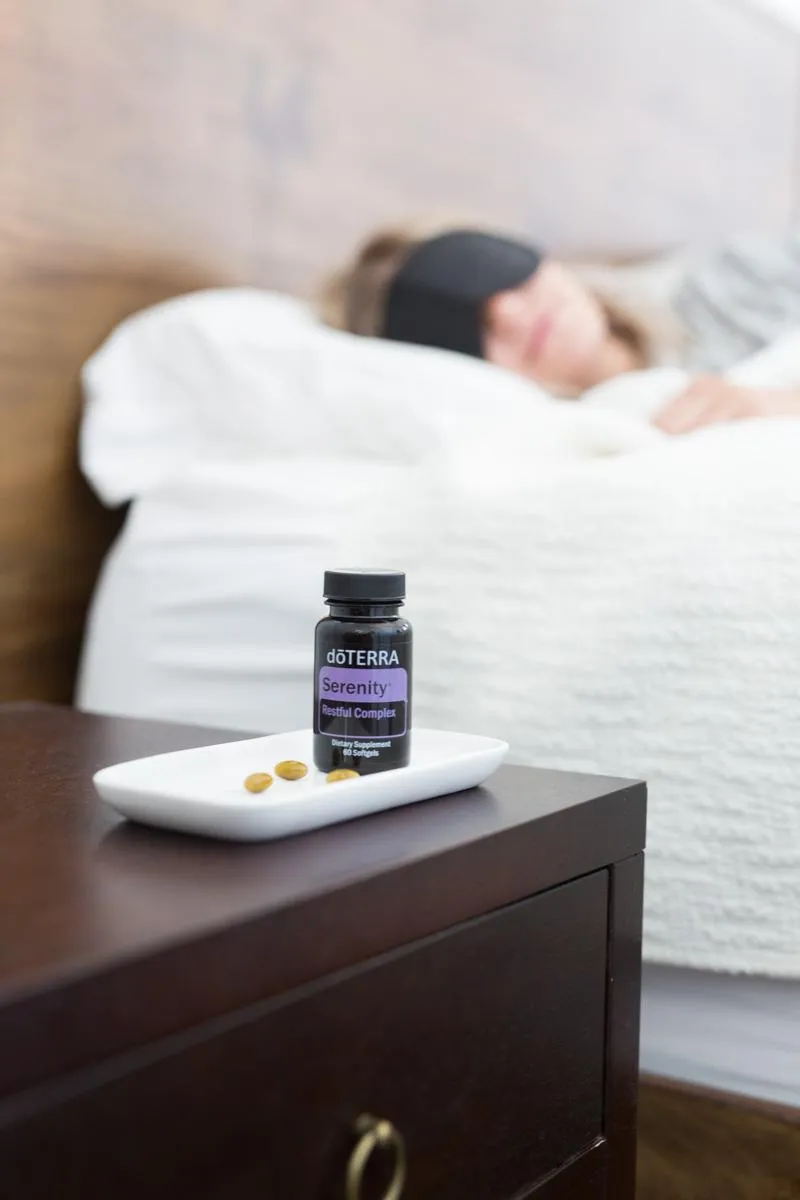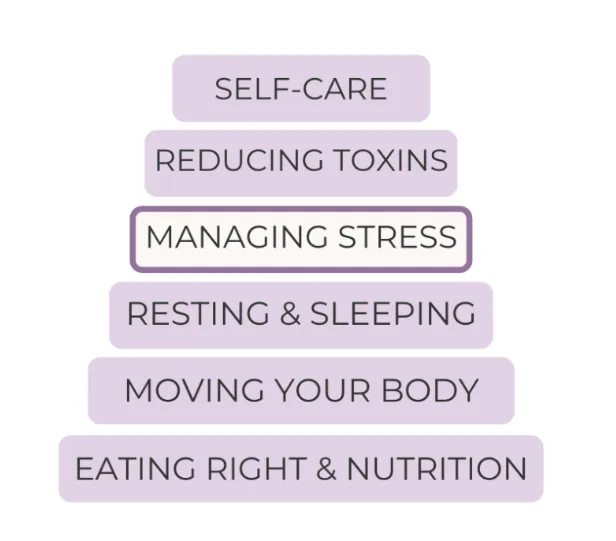
Rest & Sleep +
Managing Stress
in Pregnancy

Sleep Is An Oft-Ignored But Key Factor In Your Overall Well-Being...
Yet, so many of us struggle to get enough restful sleep each night. It may feel like your head hitting the pillow activates a switch in your brain to worry about the past, present, and future all at once. If this is a familiar situation for you, read on to discover how to enjoy restful sleep each night.


The Importance Of Sleeping
Sleep is not a passive time when your entire body rests, but rather a critical time of dynamic and important changes. Virtually all bodily systems are impacted by the amount of sleep you get.

Cell renewal and healing
Tissue repair, skin regeneration, and wound healing
Immune cell replenishment and antibody creation
Memory consolidation
New brain pathways are formed, and brain metabolites are cleared
Metabolism and appetite regulation
Release of growth hormone to boost muscle mass
Mood regulation
Restoration of nervous, immune, and musculoskeletal systems function
Eating Right
Doesn’t just improve your physical health, it also leads to healthy sleeping. The best foods for your total health are also good for restful sleep. Indeed, what you eat has a dramatic effect on how you sleep. Eating foods rich in fiber and low in saturated fats can help you fall asleep faster and increase the amount of deep sleep you get during the night. Too much sugar during the day may increase your middle of the night wakeups. Foods that contain high levels of B vitamins, magnesium, zinc, and polyunsaturated fatty acids can help regulate melatonin—a hormone made by the pineal gland that plays a role in sleep—production. You can even boost your melatonin levels by eating foods that naturally contain melatonin, like barley, rice, olive oil, walnuts, and tomatoes.
Foods with good levels of B vitamins: leafy greens, salmon, eggs, legumes, and sunflower seeds.
Foods with good levels of magnesium: dark chocolate, avocados, seeds, nuts, whole grains, and legumes.
Foods with good levels of zinc: Legumes, seeds, nuts, whole grains, sweet potatoes, kale, green beans, dark chocolate.
Foods with good levels of polyunsaturated fatty acids: walnuts, sunflower seeds, flax seeds, fish, sunflower oil.
Set A Schedule
Your body prefers to follow a consistent sleep pattern, so setting a bedtime schedule is key to restful sleep.Your hypothalamus regulates your sleep wake cycle and internal body clock to control your progression from wakefulness to sleepiness. While functioning optimally, the hypothalamus establishes a rhythm that causes you to get sleepy around the same time each evening and wake up in the morning about the same time each day. This rhythm is influenced by both internal (hormones, neurotransmitters, and genes) and external (sunlight, bright screens, meal timing, stimulant use) factors.
To avoid disrupting your sleep wake rhythm, you should establish a consistent routine and schedule each day.
Go to sleep and get up at the same time each day, even on weekends..
Avoid exposure to light (natural and from screens) about two hours before bedtime.
Finish meals a couple of hours before bedtime.
Avoid exercise within two hours of bedtime.
Do not nap during the day.
Create a relaxing bedtime environment: diffuse calming oils—Serenity, Adaptiv + Lavender are good options, take a warm bath with Epsom salts and Breathe, massage your feet with Vetiver & Wild Orange, listen to relaxing music. Make the room temperature comfortable.
Sleep on a comfortable pillow and mattress.

If you're wondering, “Why do so many people use essential oils at bedtime?” OR “How can I use essential oils to create a more restful environment for myself and my family?” be sure to download the FREE "Essential Oils and Sleep" eBook today!


Every Day, We Have Stresses, Nervous Energy, Doubts & Tension That Weigh On Us...
Yet, so many of us struggle to get enough restful sleep each night. It may feel like your head hitting the pillow activates a switch in your brain to worry about the past, present, and future all at once. If this is a familiar situation for you, read on to discover how to enjoy restful sleep each night.


How to manage stress?
Our ability to manage emotions, make decisions, and solve problems depends on our mental and emotional state. Stress can slowly erode emotional health and have significant long-term medical consequences.
Mental health begins with eating right, resting, and exercise. Additionally, cerebral practices like meditation, positive thinking, and self-development can be employed to cultivate a healthy mindset.

One
Take one Adaptiv Calming Blend Capsule daily to combat stress, tension, and occasional anxious feelings.
Two
Roll Adaptiv Touch onto wrists and temples when you feel the need to gain composure quickly.
Three
Apply doTERRA Cheer to your wrists and neck to promote feelings of optimism.
Four
Add three to four drops of Adaptiv Calming Blend to a relaxing Epsom Salt bath.
Five
Take one drop of Lavender in a glass of water to help reduce anxious feelings.
Six
Put a drop of Balance on your pillow to
help soothe worried thoughts.
Want to Get Started With Essential Oils?
Simple And Quick Solutions
While this list is not comprehensive, it is a start in helping you identify ways to help yourself. I recommend that you pick the
easiest solutions for you, and then practice them on a daily basis or whenever you feel the need.
In any situation, take two minutes to breathe. We’re not just talking about trying to breathe deeply in and out here, though that is the start of it. Improve on this idea by using the 4–7–8 breathing exercise. Breathing only through your nose, count to four as you deeply inhale, then count to seven as you hold your breath, and count to eight as you exhale. Repeat the cycle three more times. This should take around two minutes to complete. This will help you focus on your body and help you breathe more deeply on a regular basis without even needing to think about it.
Drink herbal tea. If you’ve never tried herbal tea, now might be a good time to give it a try for some stress relief. Teas like lemon balm, peppermint, chamomile, or passion flower are helpful. You can incorporate essential oils into your tea as well—infuse a drop of essential oils like Roman Chamomile, Lavender, or Melissa into herbal teas like chamomile to soothe the body and mind. Just the act of drinking warm tea can also be soothing and relaxing and just the boost you need for the day.
Get outside in the fresh air. Although this is easier to do when the weather is nice, even when the weather is not ideal, it is a good idea to at least get a few minutes of fresh air each day and get your body moving. Reconnecting to the outside world and nature can help you refocus and feel better. If you can’t go outside in this moment, reach for Vetiver. Its calming and grounding effect on emotions is great to diffuse, or to put directly in your palms, cup your hands around your nose, and inhale.
Exercise for at least for 30 minutes a day, three days a week. Exercise is known to bump up the level of endorphin production, improves your mood, and helps you move past the day’s irritations. Learn more about exercise here.
Set out 10 minutes in the morning for meditation. In yoga specifically, meditating is about being grounded physically and mentally, and coming to an expanded state of awareness. You can start meditating by choosing a consistent time and place, and then picking something to focus on for that session. (Examples of different focuses include a helpful intention or affirmation like “I am relaxed”, counting your breath as in point number one, or visualizing your favorite spot in nature and trying to keep your focus on that only.) Don’t be discouraged if your mind starts to wander, just refocus back on your purpose. You can also increase the effects of mediation by diffusing calming oils like Frankincense while you practice. There are many other ways to meditate, try different kinds before you determine how to incorporate it into your daily life.
Give yourself a hand massage. According to a 2008 study published by the Journal of Alternative and Complementary Medicine, a five-minute hand massage can lower stress levels. If you can’t find anyone to give you one, you can massage your own hands. To reduce the effects of daily stress, put a drop of Ylang Ylang or AromaTouch® and some Fractionated Coconut Oil into your palms and massage your hand slowly using the AromaTouch Hand Technique.
Apply PastTense® or doTERRA Peace®. Because PastTense comes in a roll-on bottle, this grounding and soothing blend is convenient and easy to use. (dōTERRA Peace also comes in a roll-on version that is equally as easy.) You can apply either blend to your temples, wrists, or the back of your neck in times when you need to quickly ease stressful or anxious feelings on the go.
Ensure that you get enough sleep. Dr. David K. Hill, dōTERRA Chief Medical Advisor, insists that, “Sufficient amounts of rest provide bodies with an opportunity to recover from the day’s activity, improve energy levels, and reduce the effects of stress.” If you currently struggle with falling asleep, diffuse dōTERRA Serenity® about 30 minutes before you go to bed, or take dōTERRA Serenity® Softgels.
Generate a support system. This may be our most important tip, because even though it can be hard to reach out to others when you feel overwhelmed, sometimes it is necessary to depend on other people for help. Don’t try to keep going alone. Even if the stress is over something that you feel you have to do alone, at least having someone there to listen or give you a hug (which is proven to help with stress on its own) can help more than you realize.



